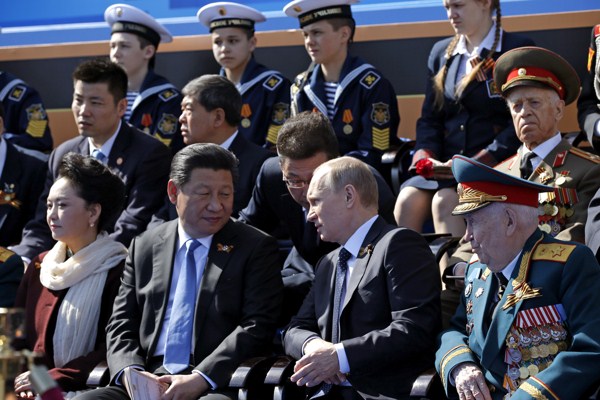One of the most noteworthy aspects of the May 9 Victory Day celebrations in Moscow marking the 70th anniversary of the Soviet defeat of Nazi Germany is how much Russian President Vladimir Putin and Chinese President Xi Jinping emphasized their two countries’ historical and other ties. Although Russian and Chinese officials no longer profess ideological solidarity based on a shared Marxist-Leninist ideology, their statements have displayed a remarkable harmony of ideas and expression. In practice, their political systems also more closely resemble each other, exposing shared vulnerabilities.
Chinese presidents had attended Victory Day parades in 2005 and 2010, but this was the first time that members of China’s military honor guard participated in the procession. Xi’s presence was even more visible due to the fact that almost all Western leaders boycotted the ceremony this year to protest Moscow’s involvement in Ukraine’s civil war. In the absence of a major Western leadership presence, Chinese and Russian leaders and media embraced a narrative of the two countries’ wartime partnership in Asia. In an article published in the government-run Russian Gazette, Xi praised what he described as Russian-Chinese military cooperation in “the Anti-Fascist War” against Germany and Japan. While he was in Moscow, Xi also bestowed medals on Soviet veterans of the war against Japan.
In fact, some prominent Chinese communists, including the son of Mao Zedong, did fight as volunteers in the Soviet army. But under Josef Stalin, who denigrated China and treated the Chinese Communist Party as a subservient Soviet foreign policy instrument, the Soviet Union resisted joining the Allied war against Japan until a few days before Tokyo’s surrender. Stalin’s Red Army then took advantage of Japan’s military exhaustion to seize and then loot large parts of northeast China as well as northern Korea and Japan’s Kuril Islands. Mao had to struggle for months to secure a Soviet military withdrawal; Russia continues to administer the Kurils despite Japan’s protests.

